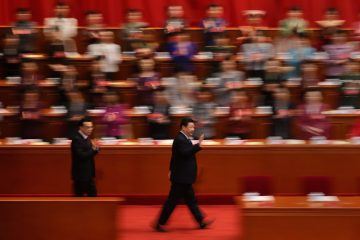
Adam Tooze in Foreign Policy:
China will scale up its Intended Nationally Determined Contributions by adopting more vigorous policies and measures. We aim to have [carbon dioxide] emissions peak before 2030 and achieve carbon neutrality before 2060.”
Xi Jinping’s speech via video link to the United Nations General Assembly on Sept. 22 was not widely trailed in advance. But with those two short sentences China’s leader may have redefined the future prospects for humanity.
That may sound like hyperbole, but in the world of climate politics it is hard to exaggerate China’s centrality. Thanks to the gigantic surge in economic growth since 2000 and its reliance on coal-fired electricity generation, China is now by far the largest emitter of carbon dioxide. At about 28 percent of the global total, the carbon dioxide produced in China (as opposed to that consumed in the form of Chinese exports) is about as much as that produced by the United States, European Union, and India combined. Per capita, its emissions are now greater than those of the EU if we count carbon dioxide emissions on a production rather than a consumption basis.
Global warming is produced not by the annual flows of carbon but by the stocks that have accumulated over time in the Earth’s atmosphere. Allowing an equal ration for every person on the planet, it remains the case that the historic responsibility for excessive carbon accumulation lies overwhelmingly with the United States and Europe. Still today China’s emissions per capita are less than half those of the United States. But as far as future emissions are concerned, everything hinges on China.
More here.
